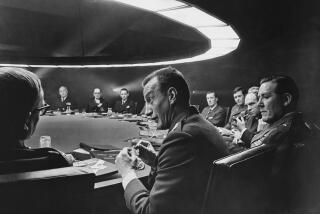The shame of ‘O’
One of the disturbing paradoxes of contemporary American life is the way in which our capacity for genuine outrage has declined as the general rancor of our political and cultural conversations has risen.
FOR THE RECORD:
Political novel: Tim Rutten’s Feb. 2 Op-Ed column about Simon & Schuster’s promotion of the political novel “O” cited two passages it said were from the book, saying they demonstrated the author’s partisanship. Neither passage actually appeared in the book. They were both taken from a parody that appeared on the website of the British newspaper the Guardian.
It’s also probably no accident that the loss of our collective ability to express justified indignation — as opposed to generalized rage — has been accompanied by the virtual extinction of the response that outrage is meant to evoke: shame.
That said, we ought to be outraged, and somebody should be ashamed, over the all-but-unremarked-upon scandal surrounding Simon & Schuster’s publication of “O: A Presidential Novel.” The book is a highly promoted, anonymously written fictional account of the coming 2012 general election in which the incumbent, Barack Obama — coyly referred to only by his initial — confronts a Republican challenger clearly modeled on Mitt Romney.
Simon & Schuster’s publisher, Jonathan Karp, has claimed that the book “offers some resonant truths about what President Obama is really thinking.” As I noted in The Times’ wholly unfavorable review of “O” last week, “my reviewers’ copy arrived with an unusual letter from … Karp, informing us that the author of this novel ‘is someone who has been in the room with Barack Obama and knows this world intimately. The author wishes to remain anonymous to avoid being pigeonholed or ignored or scorned on the basis of associations, views or background.’”
Now, marketing campaigns, like Dr. Johnson’s epitaphs, “are not given under oath,” but they are supposed to stop somewhere just this side of outright deception, which this one didn’t. Karp’s description clearly was meant to suggest that the author was someone with extensive firsthand knowledge of the president and his thinking, and whose motives for remaining anonymous are honorable. Similarly, in an appearance on NBC’s “Today” show, Karp argued that “there’s lot of creative freedom in being anonymous; you can say a lot of things. You can really put it all out there if you don’t have to worry about your name being out there.”
That’s particularly true if you don’t have the most essential of the credentials your publisher claims for you — an intimate acquaintance with the president — but are freighted with troublesome baggage, like a demonstrated history of antagonism for Obama and a carload of political scores to settle.
That’s certainly the case with the author of “O,” who now has been all but conclusively identified as Mark Salter, a former ghostwriter, aide and chief speechwriter for John McCain. Salter isn’t just any political operative but one whose connection to the Arizona senator is so close and of such long standing that he’s frequently referred to as McCain’s “alter ego.” He is widely credited with coaxing McCain into retelling the story of his heroic conduct as a prisoner of war, which made the first book on which he collaborated, “Faith of My Fathers,” a memorable political memoir. By all accounts, Salter took McCain’s loss to Obama harder than most of his staff. Since that defeat, he has weighed leaving politics.
He also was frank about what he felt was the senator’s unfair treatment by the media and, particularly, by new-media outlets such as the Huffington Post and Politico. As Salter alleged to Time magazine concerning the media’s role in his candidate’s defeat: “On top of everything, we had a thumb on the scale. It wasn’t right, but it was what it was.”
It isn’t “pigeonholing” to observe that we now understand a great deal more about some of this novel’s characterizations. Obama, for example, is portrayed as arrogant, scornful of the electorate and the political process, and almost petulantly resentful of the demands of office. Salter’s authorship also helps explain passages in which “O” reflects admiringly on his first opponent’s willingness “always [to] put his country first” or one in which he “wished he had his former opponent’s courage, valor, integrity.”
It also casts a different light on the lacerating characterizations of Sarah Palin — “the Barracuda” — Arianna Huffington and the founding editors of Politico, who are caricatured as ruthlessly self-interested careerists. Note the consistency: Everyone who failed to assist the courageous McCain campaign did so for unworthy reasons.
The venality here is that of Simon & Schuster and Salter, which hoped for a big paycheck out of this shoddy and deceptive little enterprise. Perhaps they’ve been punished where it will hurt them the most, since “O” has — as they say — tanked at the box office.
More to Read
A cure for the common opinion
Get thought-provoking perspectives with our weekly newsletter.
You may occasionally receive promotional content from the Los Angeles Times.






